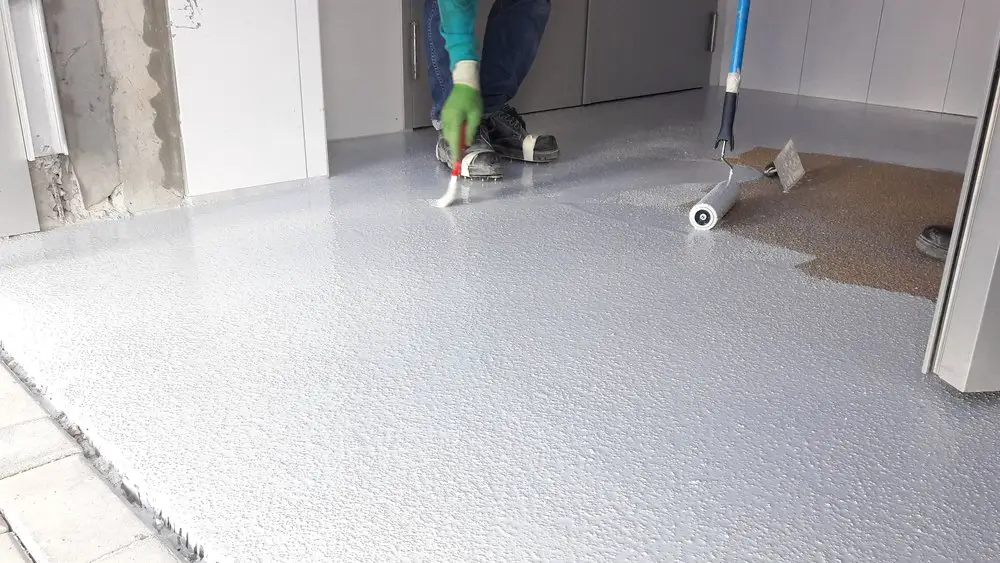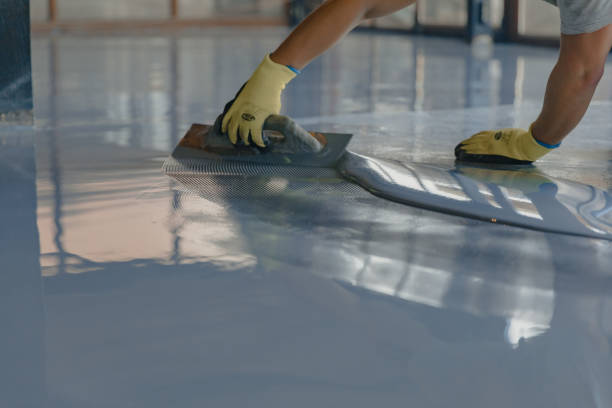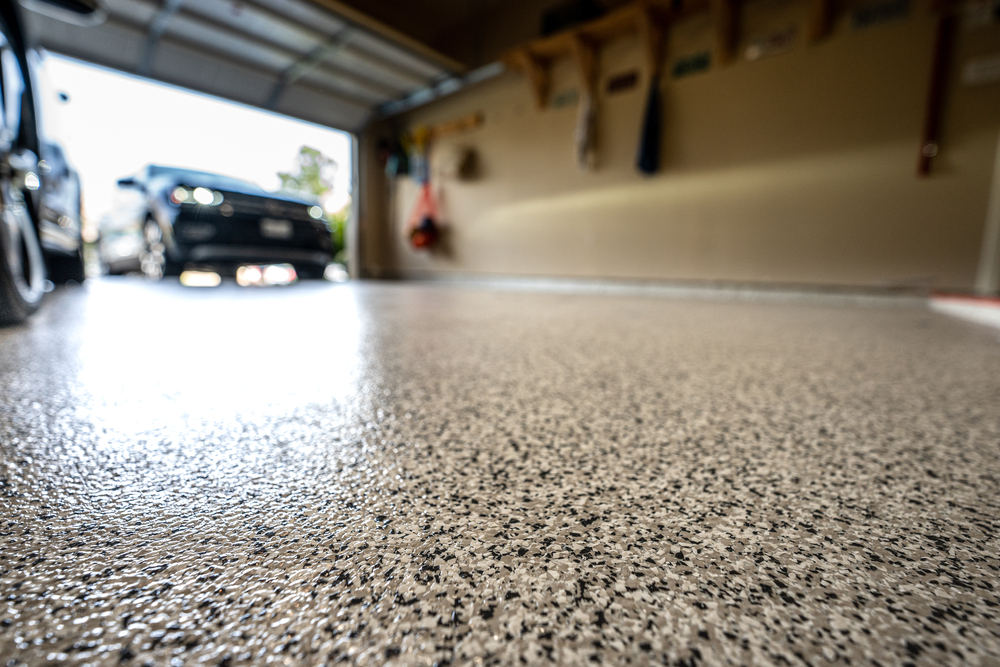When it comes to protecting and enhancing your garage floor, two popular options often come to mind: polyurea and epoxy. Both offer distinct qualities and benefits, sparking a common question among homeowners and contractors alike: Is polyurea better than epoxy for garage floors?
This article aims to delve into the properties, applications, and performance of both materials to help you make an informed decision for your garage flooring needs.
Firstly, Polyurea is a type of elastomer derived from step-growth polymerization, a process that involves the reaction between a resin blend component and isocyanate.
This chemistry yields a material that is exceptionally strong, flexible, and resistant to abrasion and corrosion. It’s known for its fast curing time and ability to adhere well to most surfaces.
On the other hand, Epoxy is a thermosetting resin, which, upon mixing with a hardener, undergoes a chemical reaction that transforms it into a highly cross-linked polymer.
This results in a surface that is extremely hard, durable, and resistant to chemicals. Epoxy coatings have long been used in industrial settings due to their toughness and resistance, but are well-suited to residential garages as well.
Understanding Polyurea
What is Polyurea?

Polyurea is an advanced material known for its remarkable durability, elasticity, and speed of cure. It is a two-component system, involving the reaction of a resin blend component with an isocyanate to produce a plastic-like or rubber-like compound.
This compound exhibits impressive properties such as high tensile strength, extreme flexibility, and excellent resistance to abrasion and corrosion.
Polyurea is also known for its fast curing time, typically setting within seconds of application, and its ability to bond securely to virtually any substrate, including concrete, metal, and wood.
Pros and Cons of Using Polyurea for Garage Floors
Pros
One of the main advantages of polyurea for garage floors is its incredible resistance to chemicals, making it an ideal choice for garages where vehicles and other machinery are stored. It is not affected by most solvents, oils, and other automotive fluids.
Its fast curing time is another major benefit, as it allows for rapid turnaround times for installation.
Additionally, due to its elasticity, polyurea is better at handling temperature fluctuations and can absorb impact without cracking or peeling off, thus offering excellent longevity.
Cons
Despite its impressive features, polyurea has some drawbacks. Firstly, it is more expensive than epoxy, which may deter homeowners on a tight budget.
Moreover, due to its rapid curing property, it does not self-level like epoxy, which can lead to irregularities on the surface if not applied by a skilled professional.
Lastly, while it adheres strongly to most surfaces, the substrate must be thoroughly prepared and cleaned to ensure proper adhesion, making the installation process more labor-intensive than other options.
Understanding Epoxy

Description of Epoxy
Epoxy is a thermosetting resin that, when mixed with a hardener, forms a tough, adhesive, and highly resistant coating. It’s a popular choice for garage floors due to its durability, aesthetic appeal, and ability to withstand heavy loads, high traffic, and the impact of dropped tools.
Its smooth and seamless surface is easy to clean and maintain, while its variety of decorative options, such as colored flakes and metallic finishes, can enhance the visual appeal of any garage.
Advantages and Disadvantages of Using Epoxy for Garage Floors
Advantages
Epoxy flooring is lauded for its exceptional durability and resistance to oil stains and water, which is essential in a garage setting. It’s also resistant to chemical spills, making it suitable for garages that double as a workspace.
Epoxy flooring is self-leveling, which ensures a smooth and uniform surface. Its numerous design options also allow homeowners to customize their garage floor to match their aesthetic preferences.
Disadvantages
However, epoxy is not without its limitations. It requires a carefully prepared surface for proper adhesion, and any existing concrete must be free of moisture, oil, and dirt.
It also has a longer curing time compared to polyurea, which could extend the installation process. Temperature sensitivity is another concern; epoxy can peel off if exposed to extreme temperature fluctuations, diminishing its lifespan.
Finally, epoxy’s hardness, while a strength in terms of durability, could also be a disadvantage. It may create a slippery surface when wet, posing a potential safety risk.
Comparison between Polyurea and Epoxy
Comparison of Durability
When comparing the durability between polyurea and epoxy, polyurea often comes out on top. Polyurea is well-regarded for its superior durability and long lifespan.
It has enhanced properties that make it more flexible than epoxy, which allows it to withstand impacts and mechanical stress better.
This flexibility makes polyurea less likely to crack under pressure or due to concrete movement underneath.
Comparison of Resistance to Chemicals, Stains, and UV Light
Both polyurea and epoxy offer resistance to chemicals and stains, vital for a garage floor. However, polyurea outperforms epoxy when it comes to UV resistance.
While epoxy can yellow or fade when exposed to sunlight over time, polyurea retains its color and gloss, making it a more suitable choice for garages with natural light or outdoor settings.
Beyond the initial resistance to chemicals and stains, polyurea’s advanced formulation further shines in harsh environments. It has an innate ability to resist damage from a broader range of chemicals, including those often found in garages, like motor oil and gasoline.
This resistance extends to stubborn stains that would typically mar an epoxy surface, making polyurea particularly resilient in a high-traffic area like a garage.
In terms of UV light resistance, polyurea’s superior performance holds significant worth. Epoxy is known to fade or discolor over time upon direct exposure to sunlight. This is particularly problematic in garages with windows or open doors that allow natural sunlight to filter in.
Conversely, polyurea maintains its color and gloss, even under consistent UV exposure. This UV stability not only enhances its visual appeal but also negates the need for regular recoating, making polyurea a cost-effective solution in the long run.
Comparison of Installation Process and Curing Time
The installation process and curing time are other areas where polyurea has a significant advantage over epoxy. Polyurea cures at a much faster rate, often being ready for use within a day of application, significantly reducing downtime.
Conversely, epoxy requires a multi-step installation process and a longer curing period, often taking several days before it’s fully set and ready for use.
The speed of polyurea’s cure, combined with its ability to be applied at a wide range of temperatures, makes it a more flexible option for quick installations.
Diving deeper into the installation process, it’s worth noting the ease of applying polyurea. Its one-step application process is far less complicated than the multi-step, labor-intensive process required for epoxy.
This simplicity often translates to fewer errors during installation, ensuring a smoother, more uniform surface upon completion.
Additionally, the rapid curing time of polyurea has another often overlooked advantage – it reduces the chances of contaminants like dust or debris getting embedded into the coating.
In contrast, the epoxy’s longer curing process leaves it susceptible to such contamination, which can negatively affect its finish.
Lastly, due to its quick curing time, polyurea allows for a faster return of service. This is particularly beneficial in commercial settings, where prolonged downtime can lead to operational losses.
In contrast, the extended curing period of epoxy can result in longer periods of unavailability, which could be a significant disadvantage in a business setting.
Related Topics:
Conclusion
In conclusion, both polyurea and epoxy have their unique strengths when it comes to garage flooring. Polyurea boasts superior flexibility, speed of cure, and UV resistance, making it a robust and versatile choice, especially for garages exposed to a lot of wear and tear, or sunlight.
Epoxy, on the other hand, offers a hard and incredibly durable surface, resistance to chemicals, and a wide array of design options, but it may not be as resilient to extreme temperatures and UV exposure as polyurea.
Therefore, while both materials have their place, if you’re looking for the best balance between durability, longevity, and practicality, polyurea perhaps edges out epoxy as the better choice for garage floors.
FAQs
How much maintenance does a polyurea garage floor require compared to an epoxy one?
Polyurea garage floors require less maintenance than epoxy ones. They resist damage from oil, grease, and most household chemicals, requiring only regular sweeping and occasional mopping. On the other hand, epoxy floors may require occasional resealing and can be damaged by harsh chemicals, necessitating more thorough and frequent cleaning.
Does the fast cure time of polyurea affect its overall quality and durability?
No, the fast cure time of polyurea does not compromise its quality or durability. Its quick curing time can be beneficial as it reduces installation time and allows for the surface to be used sooner. Despite curing quickly, polyurea forms a strong, durable, and flexible bond that is resistant to abrasions, punctures, and UV rays.
Can the colors and designs of polyurea floor coatings be customized like epoxy?
Yes, polyurea floor coatings can be customized to a wide range of colors and designs, similar to epoxy. It can also be applied with vinyl chips or quartz to create a decorative flake floor system, providing a variety of aesthetic options to match any garage decor.


1 thought on “Is Polyurea Better Than Epoxy For Garage Floors”